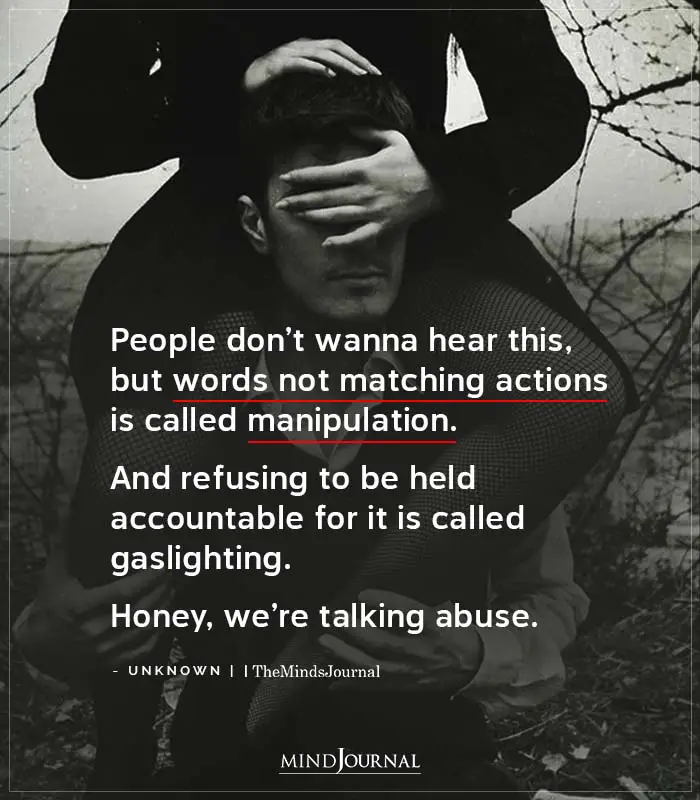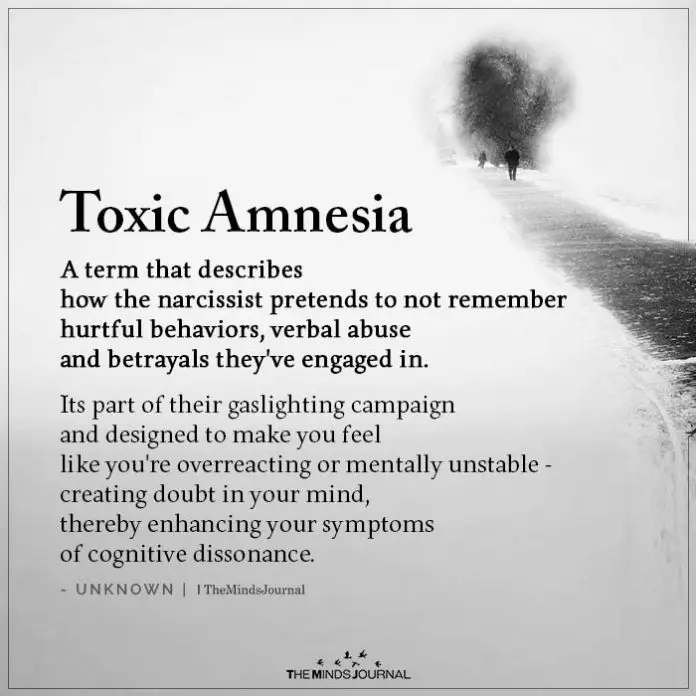Five Powerful Ways Abusive Narcissists Get Inside Your Head by Shahida Arabi. Narcissists are able to abuse in many ways, but the most common strategy they use is psychological manipulation to make you think about things that are not actually there.
Narcissistic and abusive people use a variety of covert narcissistic manipulation tactics to manipulate and control others. It’s always useful to learn about the ways narcissists get inside your head to identify if any of these tactics may have been used on you.
In popular culture, the term “narcissistic” is thrown about quite loosely, usually referring to vanity and self-absorption. This reduces narcissism to a common quality that everyone possesses and downplays the symptoms demonstrated by people with the actual disorder.
While narcissism does exist on a spectrum, narcissism as a full-fledged personality disorder is quite different. People who meet the criteria for Narcissistic Personality Disorder or those who have traits of Antisocial Personality Disorder can operate in extremely manipulative ways within the context of intimate relationships due to their deceitfulness, lack of empathy, and tendency to be interpersonally exploitative.
Although I will be focusing on narcissistic abusers in this post, due to the overlap of symptoms in these two disorders, this post can potentially apply to interactions with those who have ASPD to an extent.
Related: Are Narcissists Evil? Or Are They Just Helpless?
It’s important in any kind of relationship that we learn to identify the red flags when interacting with people who display malignant narcissism and/or antisocial traits, so we can better protect ourselves from exploitation and abuse, set boundaries, and make informed decisions about who we keep in our lives.
Understanding the nature of this narcissistic abuse and how it affects us has an enormous impact on our ability to engage in self-care and own our agency and power.

Here are five powerful ways abusive narcissists get inside your head.
Watch out for covert narcissistic manipulation tactics when you’re dating someone or in a relationship.
1. The Idealization-Devaluation-Discard Phase
Narcissists and those with antisocial traits tend to subject romantic partners through three phases within a relationship. The idealization phase (which often happens most strongly during the early stages of dating or a relationship) consists of putting you on a pedestal, making you the center of his/her world, being in contact with you frequently, and showering you with flattery and praise.
You are convinced that the narcissist can’t live without you and that you’ve met your soulmate. This is the starting point of how narcissists get inside your head.
Be wary of constant texting, shallow flattery, and wanting to be around you at all times. This is a technique known as “lovebombing” and it is how most victims get sucked in: they are tired of the “games” people play with each other in communication and are flattered by the constant attention they get from the narcissist.
You may be fooled into thinking that this means a narcissist is truly interested in you, when in fact, he or she is interested in making you dependent on their constant praise and attention.
Related: 22 Stages of Relationship Between An Empath and A Narcissist
The devaluation phase is subsequent to this idealization phase, and this is when you’re left wondering why you were so abruptly thrust off the pedestal. The narcissist will suddenly start to blow hot and cold, criticizing you, covertly and overtly putting you down, comparing you to others, emotionally withdrawing from you, and giving you the silent treatment when you’ve failed to meet their “standards.”
Since the “hot” aspect of this phase relies on intermittent reinforcement in which the narcissist gives you inconsistent spurts of the idealization phase throughout, you become convinced that perhaps you are at fault and you can “control” the narcissist’s reactions.
Even though the narcissist can be quite possessive and jealous of you, since he or she views you as an object and a source of narcissistic supply, the narcissist is prone to projecting this same behavior onto you.
The narcissist makes you seem like the needy one as you react to his or her withdrawal and withholding patterns even though the expectations of frequent contact were established early on in the relationship by the narcissist himself.
You are misled into thinking that if you just learn not to be so “needy,” “clingy,” or “jealous,” the narcissist will reward you with the loving behavior he or she demonstrated in the beginning. The narcissist may use these and other similar words to gaslight victims when they react normally to being provoked.
It’s a way to maintain control over your legitimate emotional reactions to their stonewalling, emotional withdrawal, and inconsistency.
Unfortunately, it is during the devaluation phase that a narcissist’s true self shows itself. You have to understand that the man or woman at the beginning of the relationship never truly existed. The true colors are only now beginning to show, so it will be a struggle as you attempt to reconcile the image that the narcissist presented to you with his or her current behavior.
During the discard phase, the narcissist abandons his or her victim in the most horrific, demeaning way possible to convince the victim that he or she is worthless.
This could range from: leaving the victim for another lover, humiliating the victim in public, being physically aggressive and a whole range of other demeaning behaviors to communicate to the victim that he or she is no longer important.
2. Gaslighting.

Most abusive relationships contain a certain amount of gaslighting, a technique narcissists use to convince you that your perception of the abuse is inaccurate. During the devaluation and discard phases, the narcissist will often remark upon your emotional instability, your “issues,” and displace blame of his/her abuse as your fault.
Frequent use of phrases such as “You provoked me,” “You’re too sensitive,” “I never said that,” or “You’re taking things too seriously” after the narcissists’ abusive outbursts are common and are used to gaslight you into thinking that the abuse is indeed your fault or that it never even took place.
Related: Gaslighting: 7 Warning Signs He’s Psychologically Manipulating You
Narcissists are masters of making you doubt yourself and the abuse. This is why victims so often suffer from ruminations after the ending of a relationship with a narcissist because the emotional invalidation they received from the narcissist made them feel powerless in their agency and perceptions.
This self-doubt enables them to stay within abusive relationships even when it’s clear that the relationship is a toxic one because they are led to mistrust their own instincts and interpretations of events.
3. Smear campaigns.
Narcissists keep harems because they love to have their egos stroked and they need constant validation from the outside world to feed their need for excessive admiration and confirm their grandiose sense of self-importance. They are clever chameleons who are also people-pleasers, morphing into whatever personality suits them in situations with different types of people.
It is no surprise, then, that the narcissist begins a smear campaign against you not too long after the discard phase, in order to paint you as the unstable one, and that this is usually successful with the narcissist’s support network which also tends to consist of other narcissists, people-pleasers, empaths, as well as people who are easily charmed.
Related: Narcissists, Flying Monkeys and Smear Campaigns: How To Deal With It
This smear campaign accomplishes three things:
1) it depicts you as the abuser or unstable person and deflects your accusations of abuse,
2) it provokes you, thus proving your instability to others when trying to argue his or her depiction of you, and
3) serves as a hoovering technique in which the narcissist seeks to pull you back into the trauma of the relationship as you struggle to reconcile the rumors about you with who you actually are by speaking out against the accusations. The only way to not get pulled into this tactic is by going full No Contact with both the narcissist and his or her harem.
4. Triangulation.
Healthy relationships thrive on security; unhealthy ones are filled with provocation, uncertainty, and infidelity. Narcissists get inside your head by manufacturing love triangles and bringing in the opinions of others to validate their point of view. They do this to an excessive extent in order to play puppeteer to your emotions.
In the book Psychopath Free by Jackson MacKenzie, the method of triangulation is discussed as a popular way the narcissist maintains control over your emotions. Triangulation consists of bringing the presence of another person into the dynamic of the relationship, whether it be an ex-lover, a current mistress, a relative, or a complete stranger.
Related: What You Should Know about Narcissists, NPD and their Partners
This triangulation can take place over social media, in person, or even through the narcissist’s own verbal accounts of the other woman or man. The narcissist relies on jealousy as a powerful emotion that can cause you to compete for his or her affections, so provocative statements like “I wish you’d be more like her,” or “He wants me back into his life, I don’t know what to do” are designed to trigger the abuse victim into competing and feeling insecure about his or her position in the narcissist’s life.
Unlike healthy relationships where jealousy is communicated and dealt with in a productive manner, the narcissist will belittle your feelings and continue inappropriate flirtations and affairs without a second thought. Triangulation is a powerful way abusive narcissists get inside your head.
The narcissist maintains control and keeps you in check – you’re so busy competing for his or her attention that you’re less likely to be focusing on the red flags within the relationship or looking for ways to get out of the relationship.
5. The false self and the true self.

The narcissist hides behind the armor of a “false self,” a construct of qualities and traits that he or she usually presents to the outside world. Due to this armor, you are unlikely to comprehend the full extent of a narcissist’s inhumanity and lack of empathy until you are in the discard phase.
This can make it difficult to pinpoint who the narcissistic abuser truly is – the sweet, charming, and the seemingly remorseful person that appears shortly after the abuse, or the abusive partner who ridicules, invalidates, and belittles you on a daily basis?
You suffer a great deal of cognitive dissonance trying to reconcile the illusion the narcissist first presented to you with the tormenting behaviors he or she subjects you to.
In order to cope with this cognitive dissonance, you might blame yourself for his or her abusive behavior and attempt to “improve” yourself when you have done nothing wrong, just to uphold your belief in the narcissist’s false self during the devaluation phase.
Related: The False Self vs The Real Self by Teal Scott Swan
During the discard phase, the narcissist reveals the true self – the genuinely abusive and abrasive personality beneath the shallow veneer rears its ugly head and you get a glimpse of the cruelty that was lurking within all along.
You bear witness to his or her cold, callous indifference as you are discarded. You might think this is only a momentary lapse into inhumanity, but actually, it is as close you will ever get to seeing the narcissist’s true self.
The manipulative, conniving charm that existed, in the beginning, is no more – instead, it is replaced by the genuine contempt that the narcissist felt for you all along. See, narcissists don’t truly feel empathy or love for others – so during the discard phase, they feel absolutely nothing for you except the excitement of having exhausted another source of supply.
You were just another source of supply, so do not fool yourself into thinking that the magical connection that existed, in the beginning, was in any way real. It was an illusion, much like the identity of the narcissist was an illusion.
These are five powerful ways narcissists get inside your head. It is time to pick up the pieces, go No Contact, heal, and move forward. You were not only a victim of narcissistic abuse but a survivor.
Owning this dual status as both victim and survivor permits you to own your agency after the abuse and to live the life you were meant to lead – one filled with self-care, self-love, respect, and compassion.
This is a copyrighted excerpt from the book, Becoming the Narcissist’s Nightmare: How to Devalue and Discard the Narcissist While Supplying Yourself and first appeared on Self-Care Haven. It has been reprinted with the permission of the author by TheMindsJournal.

Interested in learning more about narcissistic abuse? Pre-order my new book on narcissistic abuse, Becoming the Narcissist’s Nightmare: How to Devalue and Discard the Narcissist While Supplying Yourself.
Copyright © 2015, 2016 by Shahida Arabi. All rights reserved, including translation rights. No part of this entry, which is an excerpt from a copyrighted book, may be reproduced, distributed, or transmitted in any form or by any means, including photocopying, recording, or other electronic or mechanical methods, without the prior written permission of the author.












Leave a Reply
You must be logged in to post a comment.